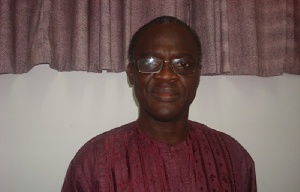The General Agriculture Workers’ Union (GAWU) of the Ghana Trades Union Congress (TUC) in collaboration with the International Labour Organisation (ILO) has started a joint initiative to combat child labour at Kpandu Torkor in the Volta Region.
The GAWU-ILO-Irish Project seeks to strengthen the capacity of informal workers in Kpando-Torkor to effectively combat child labour through enhanced social responsibility, occupational safety and health and improved productivity in Lake Volta Fishing.
The global project on the theme “Testing methodologies to support informal economy workers and small producers to combat hazardous child labour in their own sectors” covers countries with focus areas such as Ghana: Lake Volta Fishing; Benin: Stone Crushing; India: stone quarrying in Rajasthan and Zambia: extending District Child Labour Committees.
The objectives of the Ghana component include enhancing through sensitisation and social mobilisation of the organisation and capacity of the local members of the GAWU and the Inland Canoe Fishers Association in Torkor to respect and protect the rights of children in the selected communities along the Volta Lake, including their right to education and protection from hazardous work.
Mr Kingsley Ofei-Nkansah, the General Secretary of GAWU, in his remark at the project’s inception workshop in Accra, at the weekend, said the Union had over the past 50 years involved in the fight to overcome child labour in the agriculture sector.
He recollected that in 1979; GAWU had been working together with the Inland Canoe Fishers Association in the Kpandu Torkor area to eliminate child labour in fishing.
He recounted that since 1997, GAWU had extended its focus on elimination of child labour from farms in the three northern regions and the seven cocoa growing areas of the country.
He said at the end of the Kpandu Torkor Project, the ability of fishermen and fish mongers to apply safe, healthy and efficient methods in fishing and fish processing to increase their productivity and ability to strengthen their existing cooperatives groups would have been improved through sensitisation and training.
Mr Ofei-Nkansah said although Ghana was yet to ratify the ILO Convention 155, it had already ratified ILO Convention 184; which concerns Safety and Health in Agriculture.
Mr Emmanuel Kwame Mensah, an Independent Development Consultant, pointed out that child labour in the fishing industry was a reality and that some of the children sometimes meet their untimely deaths under the water in an attempt to disentangle fishing nets.
He said knowledge gained from the implementation of interventions under the project would be shared with local government authorities and other development partners, to promote the elimination of hazardous work in Volta Lake fishing in Ghana.
Mr Mensah said the programme's strategy was to reduce child labour in fishing to the barest minimum in Kpandu Tokor and surrounding villages; and to ensure that all children of school-going age were in school.
He noted that there would be collaboration with the Kpandu District Assembly and local communities to make school more accessible and attractive to children.
He said at the end of the project fishers and fish mongers would have no need of children because of safety practices, enhanced working conditions and increased income as a result of occupational safety and health and productivity training and services.
He said the project would promote among the people of Kpandu Torkor community ownership and commitment to protect the rights of children, due to effective awareness raising and social mobilisation; and effective community surveillance against child labour.
Mr Mensah said through the project the supply of children for labour would be made unattractive due to less demand and more child protection, through community surveillance.
He mentioned that challenges facing the implementation of the project was lost time due to delays in administrative issues; which was supposed to take off in January to December 2015; but was eventually now taking effect from May to November 2015.
He said the project would give GAWU the opportunities to consolidate and expand its achievements in Kpandu Torkor.
Mr Mensah said through the project the TUC could enhance the implementation of its child labour policy.
Mr Sydney Ahiabor of the Citizenship Movement Against Corruption/GAWU and a participant at the workshop told GNA that, through persistent action by all and sundry, the menace of child labour would be eliminated in the country.
Mrs Stella Assiam-Amissah of GAWU and a participants urged Ghanaians to take the issue of addressing child labour very seriously.
Click to view details



Regional News of Tuesday, 12 May 2015
Source: GNA

















